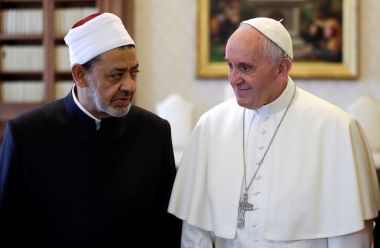Historic meeting between Pope Francis and Egyptian grand Imam held today
Pope Francis today held a historic meeting with the grand imam of Egypt's highest Islamic authority, signalling a significant step toward healing fractured interfaith relations.

Ahmed al-Tayeb, of the Al-Azhar mosque and university centre in Cairo, met with the Pope in Rome. Francis is believed to be looking to heal Vatican relations with the influential centre of Sunni Muslim learning after dialogue was frozen five years ago.
Al-Azhar cut contacts with the Vatican in 2011 over what it said were repeated insults toward Islam from Francis' predecessor, Pope Benedict.
The decision came just days after Benedict denounced what he called "a strategy of violence that has Christians as a target" following a bomb attack outside a church in the Egyptian city of Alexandria that killed 23 people.
Since his election in 2013, Francis has put great emphasis on improving interfaith relations and smiled warmly as he greeted al-Tayeb.
"The message is the meeting," the Pope told reporters.
A statement from Al-Azhar said al-Tayeb had accepted the invitation to Rome in the hopes of exploring "efforts to spread peace and co-existence".
In a subsequent statement, the Vatican said the two men discussed the problems of violence and terrorism, and the situation of Christians in the Middle East, including how best to protect them. It said the meeting was "very cordial" and of "great significance".
It lasted around 30 minutes and reportedly ended with an embrace between the two faith leaders.
Pope Francis last year urged an end to what he called a genocide against Christians in the Middle East, but he has also said it is wrong to equate Islam with violence.
In an interview last week, he said "the idea of conquest is inherent to the soul of Islam" but added that Christianity had the same missionary goal in its "Great Commission" where Jesus told his apostles to "go and make disciples of all nations".
Looking to set an example for Europe, Francis has taken in Muslim refugees fleeing the war in Syria. Last week he criticised Western powers for trying to export their own brand of democracy to the Middle East and Africa without respecting indigenous political cultures.
Christians, mostly Orthodox Copts, account for about 10 per cent of Egypt's population, which is overwhelmingly Sunni Muslim.
Sectarian violence sometimes erupts over disputes on issues related to church building, religious conversions and interfaith relationships.
The United States Commission on International Religious Freedom (USCIRF) earlier this month recommended that the US State Department add Egypt to its list of "countries of particular concern", where "particularly severe violations of religious freedom are perpetuated or tolerated".
Though the Egyptian government has taken "positive steps to address some religious freedom concerns" in the past year, there remains a "climate of impunity," the USCIRF said.
The Al-Azhar university has some 450,000 students, many from countries across Asia and Africa. It also has a network of more than 9,000 schools across Egypt attended by more than two million students.
Additional reporting by Reuters.











